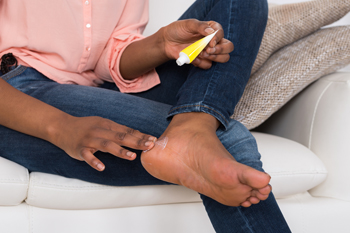Cracked heels can be unsightly and uncomfortable with yellowing, thickened calluses, and visible splits in the skin. Dry skin is a common cause of cracked heels and in some cases that dry skin is the result of eczema, psoriasis, arthritis, or cold dry climates. Left untreated, cracked heels can be particularly problematic for people with diabetes as the fissures can deepen, bleed, and turn into open ulcers that may become infected. You can help prevent cracked heels from developing by exfoliating and moisturizing your feet regularly, avoiding walking barefoot or wearing open-heeled shoes, and inserting heel cups into shoes which decreases stress on your heels. If you have cracked heels and believe they may be infected, a podiatrist can provide a variety of treatments as well as additional tips on how to prevent them from reoccurring.
If the skin on your feet starts to crack, you may want to see a podiatrist to find treatment. If you have any concerns, contact one of our podiatrists from Summit Podiatry. Our doctors can provide the care you need to keep you pain-free and on your feet.
Cracked Heels
It is important to moisturize your cracked heels in order to prevent pain, bleeding, and infection. The reason cracked heels form is because the skin on the foot is too dry to support the immense pressure placed on them. When the foot expands, the dry skin on the foot begins to split.
Ways to Help Heal Them
- Invest in a good foot cream
- Try Using Petroleum Jelly
- Ease up on Soaps
- Drink Plenty of Water
Ways to Prevent Cracked Heels
- Moisturize After Showering
- Skip a Shower
- Keep Shower Water Lukewarm
- Don’t Scrub Your Feet
If you are unsure how to proceed in treating cracked heels, seek guidance from a podiatrist. Your doctor will help you with any questions or information you may need.
If you have any questions, please feel free to contact one of our offices located in Wilmington, Whiteville, and Wallace, NC . We offer the newest diagnostic and treatment technologies for all your foot care needs.

